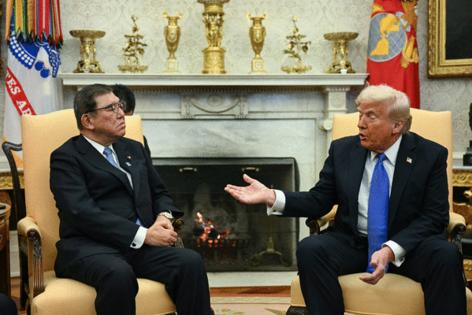Japan seeks possibility of trade deal with US as G-7 looms
Published in News & Features
Japan and the U.S. held another round of trade talks in Washington as officials try to reach an agreement ahead of a Group of Seven summit in Canada and a meeting between President Donald Trump and Prime Minister Shigeru Ishiba.
Japan’s top trade negotiator Ryosei Akazawa met with U.S. Commerce Secretary Howard Lutnick for 70 minutes and Treasury Secretary Scott Bessent for 45 minutes on Friday. The talks took place a few hours after Ishiba said Japan is continuing to ask the U.S. to withdraw the tariffs following a call with the U.S. president.
“To achieve an agreement that is mutually beneficial, we engaged in very in-depth discussions with the two ministers and explored the possibility of reaching an agreement,” Akazawa told reporters after the sixth round of trade negotiations. “We further deepened discussions on issues such as expanding bilateral trade, non-tariff measures and cooperation on economic security.”
Akazawa declined to say if a path toward a deal is in sight or comment on whether Ishiba and Trump may announce a deal on the sidelines of the G-7 gathering in Canada starting Sunday. Akazawa said he may join the premier in Canada.
Following the earlier call with Trump, Ishiba said both sides had agreed to accelerate talks toward reaching a mutually beneficial deal and to meet in Canada.
Japan is among the world’s major exporters most at risk from Trump’s wave of trade tariffs as its economy teeters on the brink of a technical recession ahead of a national election. The U.S. administration has imposed a 25% tariff on imported cars and auto parts and a 50% levy on steel and aluminum. A 10% across-the-board duty on other goods from Japan will rise to 24% on July 9 barring a deal.
The auto-related tariff is likely to hit Japan’s economy hardest given that cars and auto parts make up a third of the nation’s exports to the U.S. and the industry is one of its biggest employers.
Earlier this week, Trump floated the idea of raising auto tariffs even more, a move that would further ramp up the pressure on Japan’s top automakers and a widespread ecosystem of suppliers and related businesses.
Toyota Motor Corp., Honda Motor Co., Nissan Motor Co. and other Japanese car manufacturers are already bracing for a collective profit hit of more than $19 billion this fiscal year alone from the existing levy.
Akazawa said Japan is trying to avoid the auto tariffs going even higher via its bilateral talks with the U.S. He didn’t reveal any further specifics of the latest negotiations and said Japan is continuing to aim for a single package of trade agreements. Akazawa said he already briefed Ishiba on the latest negotiations while declining to comment on what specifically he told the prime minister.
In a separate development linked to another potential talking point between the two leaders, Trump formally opened the door to approving Nippon Steel Corp.’s purchase of United States Steel Corp. The Trump administration submitted a proposed national security agreement to the companies on Friday that clears the sale so long as the companies comply with the government’s terms.
“The Japanese government believes that this investment will strengthen the ability of the Japanese and U.S. steel industries to generate new innovation and lead to the strengthening of the close partnership between Japan and the U.S.,” Trade and Industry Minister Yoji Muto said following the announcement from the White House.
Progress toward accepting the deal is potentially a positive sign of how Trump will welcome Japanese efforts to invest in production in the U.S. that secures or creates jobs for Americans. Japan has highlighted its track record as the leading overseas investor in the U.S. as it seeks to reach a deal with the Trump administration.
As for the timing of a U.S.-Japan trade deal, Bessent didn’t bring up the possibility of a deadline extension in the latest round of talks, Akazawa said. The Treasury chief hinted this week that the July 9 deadline for imposing suspended across-the-board reciprocal tariffs could be extended for those countries negotiating on trade in good faith.
Akazawa deflected a question over whether Ishiba and Trump will announce a deal at the G-7.
“Negotiations can sometimes reach an agreement suddenly, or they can unexpectedly drag on for a long time,” Akazawa said. “It’s like being caught in fog. Sometimes the fog suddenly lifts in the morning. Sometimes it never seems to clear up no matter how much time passes. For that reason, I would prefer to refrain from making any premature statements.”
(Akemi Terukina contributed to this report.)
©2025 Bloomberg L.P. Visit bloomberg.com. Distributed by Tribune Content Agency, LLC.







Comments